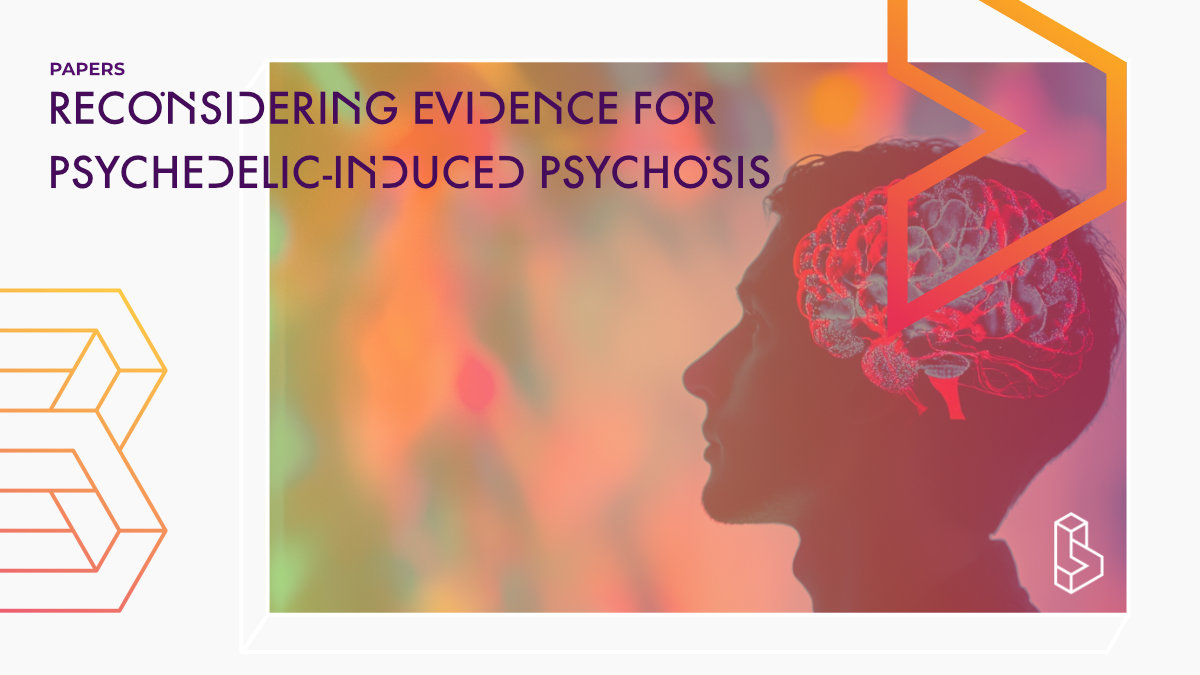This systematic review (2024) and meta-analysis (s=131) examines the incidence of psychedelic-induced psychosis, focusing on individuals with schizophrenia. It finds an incidence of 0.002% in population studies, 0.2% in UCTs, and 0.6% in RCTs, with 3.8% of UCT participants with schizophrenia developing long-lasting psychotic symptoms. It also reports that 13.1% of those with psychedelic-induced psychosis later developed schizophrenia.
Abstract of Reconsidering evidence for psychedelic-induced psychosis
“Background Persons with schizophrenia are excluded from psychedelic-assisted therapy due to concerns about the risk of triggering or worsening psychosis. However, there is limited meta-analytic data on the risk of psychedelic-induced psychosis in individuals with pre-existing psychotic disorders.
Methods We conducted a systematic review, meta-analysis, and overview of reviews to assess the incidence of psychedelic-induced psychosis and symptom exacerbation in schizophrenia. Our pre-registered protocol (CRD42023399591) covered: LSD, psilocybin, mescaline, DMT, and MDMA, using data from Embase, PubMed, PsyARTICLES, PsyINFO, and trial registries up to November 2023. A random-effects model was used to calculate psychosis incidence, with standardized assessments of study quality.
Results From 131 publications, we analyzed 14 systematic reviews, 20 reviews, 35 randomized-controlled trials (RCTs), 10 case-control studies, 30 uncontrolled trials (UCTs), and 22 cohort studies, most of which were low quality. Meta-analysis of nine studies showed an incidence of psychedelic-induced psychosis at 0.002% in population studies, 0.2% in UCTs, and 0.6% in RCTs. In UCTs including individuals with schizophrenia, 3.8% developed long-lasting psychotic symptoms. Of those with psychedelic-induced psychosis, 13.1% later developed schizophrenia. Sensitivity analyses confirmed the results.
Conclusion In summary, the reviewed evidence suggests that schizophrenia might not be a definite exclusion criterion for clinical trials exploring safety and efficacy of psychedelics for treatment-resistant depression and negative symptoms. However, given the low quality and limited number of studies, more high-quality research is needed, and a conservative approach is recommended until further data is available.”
Authors: Michel Sabé, Adi Sulstarova, Alban Glangetas, Marco De Pieri, Luc Mallet, Logos Curtis, Héléne Richard-Lepouriel, Louise Penzenstadler, Federico Seragnoli, Gabriel Thorens, Daniele Zullino, Katrin H. Preller, Kerem Böge, Stefan Leucht, Christoph U. Correll, Marco Solmi, Stefan Kaiser & Matthias Kirschner
Summary of Reconsidering evidence for psychedelic-induced psychosis
The introduction highlights the rapidly growing interest in the therapeutic potential of psychedelics, such as LSD, psilocybin, mescaline, DMT, and MDMA, for treating various mental health disorders. The resurgence of research is supported by entities like the U.S. Food and Drug Administration (FDA) and has shown promise for treatment-resistant conditions including depression, PTSD, anxiety, and substance use disorders.
Despite these advancements, specific populations, such as individuals with schizophrenia, are generally excluded from psychedelic-assisted therapy. This exclusion stems from concerns about triggering or exacerbating psychotic symptoms. Historically, the serotonin hypothesis of schizophrenia proposed that serotonin-2A receptor overactivity might underlie schizophrenia. Psychedelics, which primarily target this receptor, were thus suspected of potentially worsening psychotic symptoms. However, recent studies indicate that substances like cannabis and psychostimulants are far more likely to induce psychosis than psychedelics. Psychedelic-induced psychosis, when it occurs, is usually temporary and distinct from the dopamine-related psychosis typical in schizophrenia.
Research from the mid-20th century included trials of LSD in individuals with schizophrenia. These studies often reported mixed outcomes but were methodologically limited. Meanwhile, preclinical studies suggest that psychedelics may enhance neuroplasticity and ameliorate negative symptoms, offering potential for treatment-resistant schizophrenia. However, the relationship between psychedelics and psychotic episodes remains unclear, necessitating a more nuanced understanding of risks and benefits.
Methods
Registration and Search Strategy
Find this paper
https://doi.org/10.1038/s41380-024-02800-5
Open Access | Google Scholar | Backup | 🕊
Cite this paper (APA)
Sabé, M., Sulstarova, A., Glangetas, A., De Pieri, M., Mallet, L., Curtis, L., Richard-Lepouriel, H., Penzenstadler, L., Seragnoli, F., Thorens, G., Zullino, D., Preller, K., Böge, K., Leucht, S., Correll, C. U., Solmi, M., Kaiser, S., & Kirschner, M. (2024). Reconsidering evidence for psychedelic-induced psychosis: An overview of reviews, a systematic review, and meta-analysis of human studies. Molecular Psychiatry. https://doi.org/10.1038/s41380-024-02800-5
Study details
Compounds studied
LSD
DMT
Psilocybin
Mescaline
MDMA
Topics studied
Safety
Schizophrenia
Study characteristics
Meta-Analysis
Literature Review

